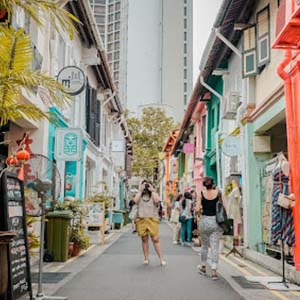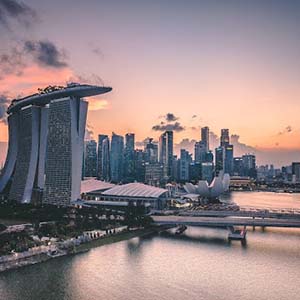Moving to Singapore
Singapore is a hugely popular destination for expats due to its high standard of living, low levels of violent crime, fantastic education opportunities and great healthcare system. English is widely spoken, so it is quite easy to integrate into the country, both professionally and socially. The strong economy means that the job market is full of opportunities and unemployment rates are among the lowest in the world..
With all this in mind, it’s no wonder that moving to Singapore has been a popular trend for years. In fact, more than 42% of residents in Singapore were not born there, placing it in the top 10 cities for expat populations in the world.

About Singapore
Population: 6.02 million
Official Languages: English, Malay, Mandarin and Tamil (English is used as the language of business)
International Dialling Code: +65
Currency: Singapore Dollar ($S, SGD)
Emergency Number: 995
Time Zone: GMT + 8
Learning the Language
Before British colonisation, the national language of Singapore was Malay, however, there are now 4 official languages spoken; English, Malay, Mandarin and Tamil. The bilingual education policy in Singapore means that most citizens can speak at least 2 languages, English is typically one of these. This is a huge draw for British expats as it means there are few language barriers to overcome when moving to Singapore.
If you can speak other languages you will likely have more opportunities when it comes to finding a job, however, speaking English in Singapore is more than enough to succeed in most careers and to settle into your new community.
Local Culture in Singapore
Singapore is a vibrant congregation of various cultures and ethnicities, and the way of life there is heavily influenced by its heritage. Traditional festivals, art and cuisine celebrate the various ethnicities that thrive there. As a resident, you can expect to enjoy celebrations like Theemithi, a Hindu festival that is celebrated for around three months and concludes with a sacred ceremony and fire-walking procession.
Singapore is remarkably clean and there is much more greenery than you might expect from a major city. It is known for handing out rather large fines to people who litter or smoke in public places. There are specific areas for smoking in the country.
Singapore isn’t an overly religious country, with 31% following Buddhism and a further 20% not practising a religion at all, so most Western practices are observed in the country. Alcohol is also widely consumed and Singapore has a lively nightlife scene too.
Like any other developed nation, you’ll find Singapore has complex rules and laws that you must abide by; most of which won’t seem very surprising or differ from the norm. However, there are some more unusual laws that could affect you, which you should be aware of before you move.Famously, Singapore has outlawed gum. Get caught chewing in public and you’ll face a large fine. Jaywalking (crossing the road at non-designated crossing points), littering, spitting in public and smoking outside of designated smoking areas are also heavily regulated and fines are common.

Annual Weather in Singapore
It is important to consider the local climate before deciding on whether to move to a new country to ensure it is an environment you will enjoy, this will also help with guiding you on what kind of clothing you will need to bring with you. Luckily, if you are planning on moving to Singapore you won’t have to worry about seasonal temperature changes, with a year-round tropical climate.
The temperature is generally above 25°C with temperatures often exceeding 30°C and remaining humid. The country is prone to rainstorms often though, with December typically the wettest month. When it rains, it pours in Singapore – the country is known for its showers. An important question to ask yourself when thinking about moving to Singapore is how you are going to prepare yourself for the weather.
When living in Singapore, you can’t go out wrapped up in your warm coat when the rain comes as you’ll bake in the heat. Equally, you can’t walk around in shorts and a T-shirt during a famous Singaporean downpour. Make sure that when you move to Singapore, you kit yourself out with the right kind of clothing. Prepare for hot sunny days and hot rainy ones, too.
With seasons of large rainfall, Singapore is also prone to flooding from time to time, but it hasn’t experienced any other natural disasters.
Passports, Visas and Permits
Visa regulation in Singapore is strict, you and your family will be required to obtain a suitable long-stay visa in order to move there. As with many international moves, there are visa options available for workers, students and those with family members who hold valid passes.
Can I Move to Singapore for Work?
If you are thinking about moving to Singapore for work then you can do this with a valid work pass, however, it is recommended you find a long-term job role before relocating. It is much easier and can be less costly, to apply for a pass before you move.
There are various work passes available, each with its own requirements and criteria. Some of the options include:
- The Employment Pass for foreign professionals earning over $5,000 per month
- The S Pass for skilled workers earning over $3,150 per month
- The Training Employment Pass for foreign professionals earning over $3,000 per month and taking part in practical training
No matter how clear-cut the criteria are, getting a visa can be a lengthy process for any country. It is recommended you start your visa application as soon as you decide to move. This gives you ample time to get accepted before making other plans.
Singapore Customs Requirements
When planning a move to Singapore from the UK, you will likely want to bring at least some of your belongings with you. Before you start packing, it is important to consider the customs requirements to ensure that you do not attempt to import any prohibited items. Personal effects and household articles that are imported to Singapore are subject to Goods and Services Tax (GST), however, as a foreign national migrating to Singapore, tax relief may be granted. GST relief will not be granted for the import of intoxicating liquors, tobacco products, motor vehicles, private aircraft, yachts or boats.
Prohibited goods include imitation tobacco products such as vapes, chewing gum and shisha.
Can I Import a Car to Singapore?
If you are moving to Singapore from the UK, then you will be glad to know they drive on the left-hand side of the road. However, although you can import your car to Singapore, it might be more cost-effective to buy a car once you are there. You can’t import cars that are more than 3 years old unless it is a registered classic car and there is a S$10,000 import tax on all cars coming into Singapore. This is a significant amount of money and unless you have a particular attachment to your car it is likely more economical to sell your car and buy a new one when you arrive in Singapore.
Can I Bring My Pet to Singapore?
The short answer to this question is yes, you can bring a pet into Singapore, but there are some strict rules on what breeds are allowed and from which countries. If you are moving to Singapore from outside of the UK, Ireland, Australia or New Zealand, your pet will have to go through thorough checks and rabies vaccinations. There is also a list of breeds of cats and dogs that are not allowed in Singapore. On top of this, many apartment buildings have strict rules on how many pets you can have and also the size and breed of your pets. For more detailed information, read this guide.
Cost of Living in Singapore
Singapore is renowned for being one of the most expensive countries in the world to live in. However, providing you have a salary that will allow you to budget for the costs, you will still be able to thrive in this wonderful country full of opportunity.
Housing Costs in Singapore
Due partly to the high GDP per capita and also the fact that the city is relatively small, half the size of London, housing costs in Singapore are among the most expensive in the world. This means you should definitely check your salary expectations and the kind of property you will be able to afford before moving to Singapore. Some examples of how much you can expect to pay for housing include the below;
Rental Prices: $550 – $7000 per month, City centre costs are high so prepare for a commute
Property Prices: $14,373 average per sqm but this varies depending on rural or city centre
Comparatively, this makes Singapore more expensive for housing than many well-established countries around the world including New York, London and Paris. For this reason, you may need to look at a smaller property in Singapore than what you currently have in the UK.
Long-Term Storage
As has been well established by this point, Singapore is not a large country so space comes at a premium. When looking at how to move to Singapore, one major concern is going to be space.
You might not be concerned about living in a smaller property than you’re used to, but where is all your stuff going to go? It is recommended that when moving to Singapore you consider UK-based storage facilities. It doesn’t matter if you are moving long-term or short-term; having your possessions stored securely without having to get rid of them is peace of mind that can really remove some stress from a move overseas.
Eventually, you may return to the UK, or move to a larger property and have them shipped out to you. The point is that there is enough to think about when moving to Singapore without having to worry about where you are going to fit all your belongings. And nobody wants to face getting rid of their favourite possessions because they cannot fit them in their home just yet.
If you’re in need of storage solutions to ease your move to Singapore, Gerson Relocation can help. Our state-of-the-art storage facilities can fit just about anything and are guaranteed to keep your possessions safe for days, months or even years.
Cost of Food and Restaurants
Another factor that you will have to consider when moving to Singapore is how much you will pay for food. As another essential, you must take this into account when thinking about your salary expectations. Singapore has a unique food economy as an island-city state, meaning it has to import most of its food and faces expensive taxes in doing so. This means that groceries can be comparatively expensive to other nations but restaurants are quite often cheaper. For example, groceries are around 21% more expensive than in London but restaurants are 51% cheaper than you’d expect to pay in London, which makes eating out common in Singapore as it doesn’t often cost much more than groceries.

Public Transportation Fees in Singapore
One of the main benefits of living in Singapore is that their public transport service has some of the lowest costs in the world, with fares calculated based on distance travelled rather than flat rates like you would pay in other major cities such as London. Some fees in Singapore are as low as $0.30 per km, whereas a journey in London can be as much as $20.00 per km. You can also make up to 5 changes on a single journey with the fare acting very much as a travel card. As an added bonus, you can even travel for up to 50% less on the public transport network if you’re an early riser, this is thanks to the introduction of the Morning Pre-Peak Fares.
How Gerson Relocation Can Help
Whether you’re considering a move to Little India, Kampong Glam, Orchard Road or Chinatown, Gerson Relocation is here to help. This is a complex move, featuring intercontinental shipping, language and cultural barriers, differences in laws and complicated immigration processes. Hiring the wrong international moving company is going to cause you nothing but stress and problems. You need a mover that can demonstrate their ability to get you where you need to go as smoothly as possible.
With our seamless Singapore removals service, we can provide our expertise at every step of the way. From packing and transporting your possessions to getting you settled in your new home, we have friendly team members and trusted partners ready to assist with your removal to Singapore.
Interested in information on another country? Take a look at our other International Relocation guides.
Great customer Experiences start here
Very pleasent and helpful. Nothing too much trouble.
Mr M H moved from London, UK to Toronto, Canada
Very helpful and patient even when things got packed that we had to get out again!
Mr M E moved from Enfield, UK to Dorset, UK
Thanks to Graham, Nick and the entire crew!
Mr C D M moved from UK to Singapore
Friendly and helpful crew.
Ms T W moved from USA to Cambridgeshire, UK
